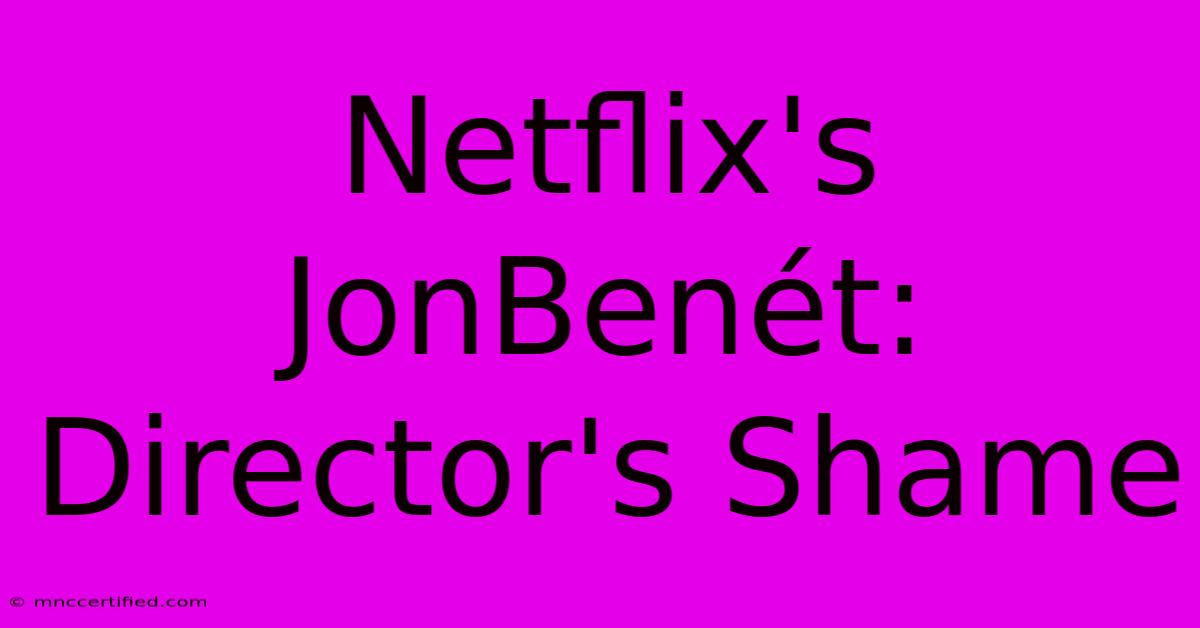Netflix's JonBenét: Director's Shame

Table of Contents
Netflix's JonBenét: Director's Shame: A Critical Analysis
The Netflix documentary, JonBenét: Director's Shame, isn't your typical true crime recounting. Instead of focusing solely on the tragic details of JonBenét Ramsey's death, it delves into the ethical quagmire surrounding the 1996 documentary, JonBenét: An American Tragedy, and its director, Michael Tracey. This meta-analysis raises critical questions about exploitative filmmaking, media responsibility, and the lasting impact of sensationalized portrayals of a child's murder. The film's title itself, JonBenét: Director's Shame, immediately signals the central theme: the ethical failings of the original documentary and its contribution to the ongoing public fascination – and, some would argue, exploitation – of the Ramsey case.
The Ethical Quandaries of "JonBenét: An American Tragedy"
JonBenét: Director's Shame meticulously dissects the original documentary, highlighting what many viewers now see as its exploitative and arguably insensitive approach. The film highlights:
-
The use of emotionally charged footage: The original documentary heavily relied on graphic images and emotionally manipulative storytelling techniques, which are now criticized for being insensitive and potentially retraumatizing for the Ramsey family and the public. This raises crucial questions about the line between investigative journalism and the sensationalization of tragedy.
-
Lack of sensitivity to the victim: The documentary's focus arguably shifted from seeking justice for JonBenét to capitalizing on the public's morbid curiosity. JonBenét: Director's Shame challenges viewers to consider the ethical implications of creating content that prioritizes ratings over respect for the deceased and her family.
-
Potential for misrepresentation: The film suggests that certain aspects of the original documentary were presented in a way that might have misled viewers, potentially hindering the investigation and shaping public perception unfairly. This raises concerns about the power of media narratives and their impact on investigations and the judicial process.
Beyond the Ramsey Case: A Broader Look at Media Ethics
JonBenét: Director's Shame transcends the specific case of JonBenét Ramsey. It serves as a cautionary tale about the responsibilities of filmmakers and media outlets when dealing with sensitive and tragic events. The documentary prompts viewers to consider:
-
The responsibility of the media in true crime: How can true crime documentaries be created responsibly, ethically, and without exploiting the suffering of victims and their families? The film encourages a discussion about best practices in sensitive filmmaking.
-
The impact of sensationalism: The documentary explores the impact of sensationalizing tragic events on public perception, the justice system, and the emotional well-being of those involved. It highlights the dangers of focusing on ratings over ethical considerations.
-
The lasting impact of media portrayals: The film shows how early media narratives can shape public opinion and potentially impede the search for truth and justice. This underlines the crucial role of responsible journalism and filmmaking in the pursuit of truth and justice.
The Power of Retrospective Analysis
JonBenét: Director's Shame is more than just a critique of a single documentary. It's a powerful example of the importance of retrospective analysis in understanding the complexities of true crime media. By examining the ethical failures of the past, the documentary encourages a more critical and responsible approach to future productions. It prompts a vital conversation about the boundaries of investigative journalism and the ethical responsibilities of media organizations.
Finding Balance: Truth and Sensitivity in True Crime
Ultimately, JonBenét: Director's Shame advocates for a more nuanced and ethical approach to true crime filmmaking. It underscores the need to strike a balance between presenting the truth and exhibiting sensitivity towards the victims and their families. The film serves as a necessary reminder that while the pursuit of truth is crucial, it should never come at the expense of compassion and ethical responsibility. This discussion is crucial for anyone interested in true crime documentaries, investigative journalism, and the ethical considerations involved in creating content about sensitive topics.

Thank you for visiting our website wich cover about Netflix's JonBenét: Director's Shame. We hope the information provided has been useful to you. Feel free to contact us if you have any questions or need further assistance. See you next time and dont miss to bookmark.
Featured Posts
-
Tonights Celtics Vs Clippers Game
Nov 26, 2024
-
Evening Standard Lopeteguis Surprise Newcastle Plan
Nov 26, 2024
-
Car Insurance Mount Pleasant Tx
Nov 26, 2024
-
Lana Del Rey Hampden Park Gig Next Year
Nov 26, 2024
-
Thanksgiving Snow Weather Warning
Nov 26, 2024